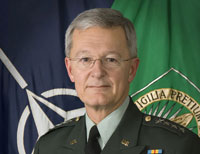NATO prepared to respond to possible violence in Kosovo
NATO's chief John Craddock reported that his troops are prepared to face violence as the breakaway territory of Serbia prepares to assert its autonomy.

Gen. John Craddock said that plans include the possibility of quickly boosting the 16,000 NATO troops currently in Kosovo.
"I think that there will be those who want to create mischief and that will be manifested as strife, potentially violence in Kosovo," Craddock told reporters at the National Press Club.
The comments come as talks between leaders from Kosovo and Serbia appear stalled ahead of a Dec. 10 deadline to report to the United Nations. Although the southern province formally remains part of Serbia, Kosovo has been run by the U.N. and NATO since 1999, when the Western military alliance ended former Yugoslav leader Slobodan Milosevic's crackdown on ethnic Albanian separatists.
Ethnic Albanians, who make up 90 percent of Kosovo's 2 million people, insist on independence. Serbia has offered broad autonomy but insists the southern province remain part of its territory.
Leaders in Kosovo have said that they will soon declare their independence.
Reflecting the degree of concern for an organization that is also responsible for leading military operations against the insurgency by the Taliban and other groups in Afghanistan, Craddock called Kosovo "the most volatile issue confronting NATO today."
Craddock said that he believes pledges by Kosovo's leaders that they will work to prevent violence. He said that NATO will be prepared to work with police in Kosovo to shut down any paramilitary group that tried to assert authority in the territory.
"We have done contingency planning for the best case and the worst case," Craddock said. "I am very comfortable with what we have done."
NATO has said that it will forcefully protect all civilians including the roughly 100,000 ethnic Serbian who remain in Kosovo.
Diplomats and international officials are grappling to come up with solutions for a growing amount of scenarios that could unfold as the province prepares to formally break away.
They worry minority Serbs will leave Kosovo for Serbia or move to northern Kosovo, where most of the 100,000 remaining Serbs are centered. If ethnic Albanians announce independence, Kosovo Serbs plan to respond with a similar declaration demanding they remain a part of Serbia.
When NATO intervened in 1999, revenge-seeking Albanian extremists attacked minority Kosovo Serbs, killing hundreds and forcing thousands to flee the province. Many Kosovo Serbs fear similar reprisals if ethnic Albanians declare independence.
Subscribe to Pravda.Ru Telegram channel, Facebook, RSS!


